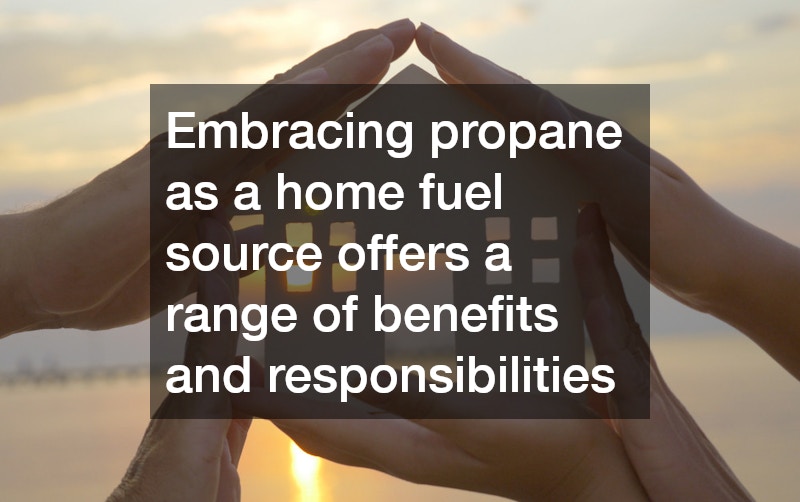When considering purchasing a home that runs on propane, prospective buyers should be aware of the fundamental differences between propane and other energy sources. Propane is a versatile and efficient fuel that can power various home systems, including heating, cooking, and even power generation. Unlike electricity, which is commonly supplied through a central grid, propane is typically stored on the property in large tanks that require regular refills.
One key reason people opt for propane is its efficiency. Homes using propane benefit from larger energy outputs at potentially lower costs, especially in regions where electricity prices are high.
It’s essential to recognize that while propane is not as widely utilized as natural gas, its impact can be significant in areas where natural gas infrastructure is limited.
Prospective homeowners should account for the logistics involved in managing a propane system. Factors like delivery schedules, tank maintenance, and safe storage are critical considerations. Understanding these logistics thoroughly can help streamline your transition to a propane-based home without unwelcome surprises.
Understanding Propane Delivery
Propane delivery plays a crucial role in maintaining a seamless experience for homeowners who rely on this energy source. Regular deliveries ensure that you have an uninterrupted supply of propane, especially during cold months when heating demands are high. Unlike natural gas which has a continuous supply, propane needs periodic attention.
When setting up your propane home, you’ll need to establish a relationship with a reputable propane delivery service. These services can work with you to determine an optimal delivery schedule based on your consumption patterns. Timely deliveries will help avoid the discomfort and potential hazards of running out of propane.
Homeowners should be aware of their propane tank’s capacity and monitor usage levels to anticipate when a refill is necessary. Many services offer automated deliveries based on your usage history, which can be a stress-free solution. Always ensure some buffer capacity to handle unexpected spikes in demand or delays in delivery.
Storage and Maintenance of Propane Tanks
The storage and maintenance of propane tanks are paramount to the safety and efficiency of your home. Tanks can be either above ground or buried, and each option has its own set of considerations. Above-ground tanks are easier to access for inspections and maintenance, while buried tanks offer aesthetic and space-saving benefits.
Regular maintenance is vital to ensure your propane system operates smoothly. This includes checking for leaks, monitoring tank pressure, and scheduling annual professional inspections. Routine care helps to prevent system malfunctions and extends the lifespan of the tank.
Proper storage protocols must be adhered to in order to minimize safety risks. Tanks should be placed a safe distance from buildings and property lines, as per local regulations. It’s also essential to keep the surrounding area free from any debris or flammable materials to reduce fire hazards.
Cost Considerations When Buying a Propane-Powered Home
When buying a propane-powered home, the cost is an important consideration that can influence your decision. While propane itself is often cost-effective compared to electricity, initial setup and maintenance can add to overall expenses. The upfront cost of installing a tank, whether it’s a purchase or a rental, should be factored into your budget.
Fluctuating prices of propane and delivery services can impact your monthly utility bills. Prospective homeowners should research regional pricing trends and possibly lock in rates with a supplier to stabilize costs. It is also wise to inquire about any contractual obligations with delivery companies as these can impact long-term expenses.
Another cost aspect to consider is the potential need to upgrade appliances or home systems for better propane efficiency. Older appliances may not be as efficient, leading to higher usage rates. Investing in modern, energy-efficient propane appliances can reduce overall fuel consumption and energy bills.
Safety Measures and Best Practices
Safety measures are critical when buying a home that utilizes propane, as mishandling can lead to dangerous situations. Homebuyers should be educated on proper propane handling and emergency protocols. Knowing how to detect leaks and understanding the odorant added to propane for leak detection can be lifesaving.
The installation of carbon monoxide detectors is advised in homes using propane. This is because carbon monoxide, a potential byproduct of incomplete propane combustion, can be hazardous. Regularly checking these detectors along with smoke alarms keeps the household secure.
Engaging with local propane safety resources or taking part in safety workshops can be beneficial. Resources from propane suppliers often include comprehensive safety guides that explain best practices for using and maintaining propane systems. Proactively addressing these safety measures can prevent accidents and ensure all family members are knowledgeable about propane-related activities.
Embracing propane as a home fuel source offers a range of benefits and responsibilities that potential homeowners should evaluate thoroughly. Propane is an efficient, reliable energy choice that can meet your home energy needs effectively with proper management. Understanding the operational logistics, costs, storage requirements, and safety practices is crucial when considering a propane-powered home.
By establishing a robust relationship with a reliable propane delivery service and adhering to best practices, homeowners can enjoy the benefits of propane while minimizing risks. With foresight and preparation, propane can be seamlessly integrated into your daily life, providing comfort and efficiency.
As with any major home decision, due diligence will ensure you make an informed choice about this energy source. The unique advantages of propane, coupled with responsible management, can provide a rewarding home ownership experience. With careful planning and attention to detail, propane can be a sustainable choice for heating and powering your home.

